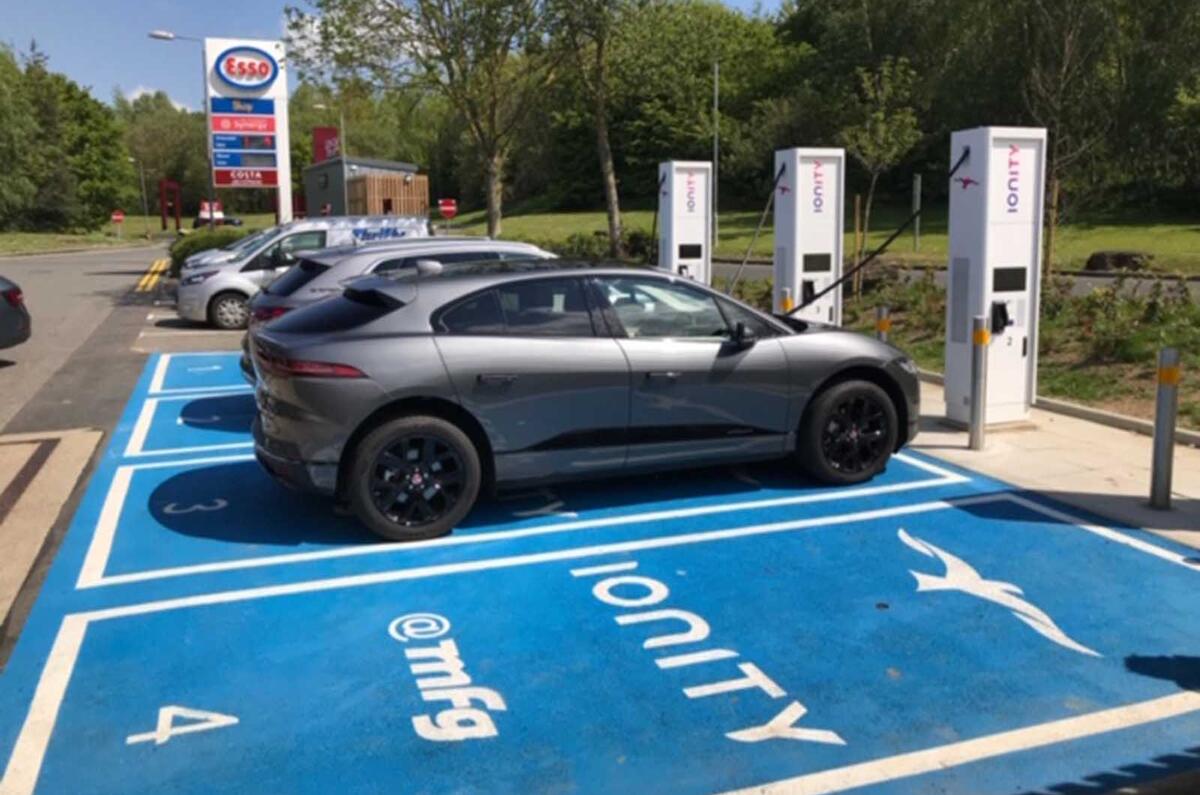Charging network Ionity, backed by car makers including Ford and Volkswagen, has opened the most powerful charging station for electric vehicles yet to launch in the UK, promising charging times of under 20 minutes.
The 350kW charging station is in Maidstone, Kent and is the first move in bigger plans by the firm to offer more than 40 UK sites, each with up to six high-power chargers. Ionity said it will soon add locations at Milton Keynes and Gretna Green.
There are currently no electric vehicles on sale which are capable of charging at 350kW. The first compatible car is expected to be the upcoming Porsche Taycan, which will go on sale early next year. However, all electric vehicles are able to charge at the points, but just at a lower rate of charge.
An Ionity spokesman said: “[Our] 350kW UK charging network is future-proofed, delivering infrastructure capable of charging times as low as eight minutes depending on the capacity of the vehicle’s battery, thus making e-mobility a convenient, reliable and everyday experience.”
Currently, the Audi E-tron has the highest charge rate of any electric model currently on sale at 150kW.
There are a handful of 150kW charging stations in the UK, including those recently announced by rival firm BP Chargemaster, but most public charging points are 50kW, meaning much slower charging times.
The Ionity spokesman added: “High-power charging is widely regarded as essential to the increased adoption of electric vehicles, making long distance journeys far more viable than the much slower 50kW alternatives.”
He added: "We are now seeing cars coming to market with capability far beyond 50kW charging so an advanced charging network is a key part of the EV jigsaw. Ionity wants to reassure consumers, and vehicle manufacturers, that fast-charging is a reality. By installing 350kW chargers we are investing in a future where long-distance EV travel is simple and practical - fast charging makes this possible."
Manufacturers are slowly introducing electric vehicles with higher charging capabilities in a bid to reduce these times. The general industry consensus is that once charging times are nearing 10 minutes for around 80% charge, those car owners wedded to petrol or diesel vehicles will more seriously consider changing to a zero-emission machine.
Ionity, a joint venture between Daimler, Ford, BMW and the Volkswagen Group, plans to install up to 2400 chargers by 2020 across Europe.
Ionity said its UK charging points will use 100% renewable energy, provided by energy technology firm Octopus Energy.
Michael Hajesch, CEO, Ionity said: “We are delighted to be launching our network in the UK with our first station in Maidstone. As car manufacturers continue to launch electric vehicles with bigger batteries to provide a longer range, high-power charging is an essential part of the e-mobility transition process thus making the e-journey a smooth and seamless experience.
Read more




Join the debate
Add your comment
Funny that VW are spending
Funny that VW are spending all this cash but it’s a Jaguar charging on their main pic
One small step for BEV one giant one for BEV kind
Probably as important if not more important than higher ranges in BEV. Also, They'll be used as a top-up only as why pay 20p a kw opposed to 9p a kw from home. All this means some people will barely use them (handy to know they're there though) but others may only use them once a month for 15 minutes when caught short
Autocar is deliberately
Autocar is deliberately omitting the fact that Tesla is already offering 250kW charging on their cars! Tesla and their supercharger network is the 600 lb gorilla in the EV world and somehow Autocar thinks that this can be ignored.....for an Ionity oddity
FRI2 wrote:
All they've done is transcribe a press release, most other sites are running with pretty much the exact same text. And its probably been done by a hack who doesn't know much about EVs .